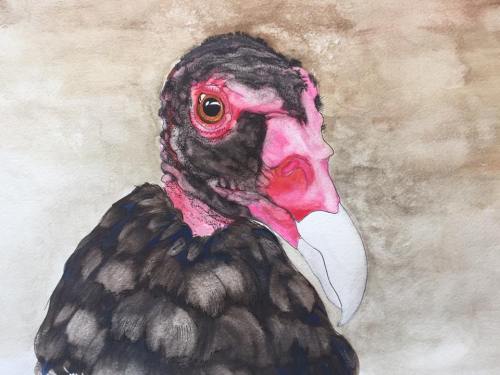
Lethe stands behind a wire fence, staring at me with piercing hazel eyes. He is bald with skin so red and wrinkled his head resembles a healing wound. Still, we creep closer to one another until we crouch on either side of the fence, almost touching.
Hello, I say. Lethe says nothing audible, but presses the side of his body against the wires, all the while keeping his gaze fixed on mine. A whiff of rot puffs into my nostrils. It is a hot day- 90 degrees or more- and we are bathed in one another’s scents- dirt and feathers, shampoo and rubber sneakers, dandruff and coffee, dead mice and sweat.
On the side of his cage, a white sheet in a plastic sleeve tells this story:
Lethe hatched in 2000 and was raised at a wildlife rehabilitation center in California. Despite precautions to keep him from imprinting on humans, he became highly socialized and upon release at a state park, kept coming down to people (particularly women) to play with their shoelaces! Even after a return to captivity and several months in isolation from people in a large flight cage with other vultures, he preferred human companionship.
Lethe: a river in the underworld. To drink its waters brings oblivion, but the kind that erases pain. Why else would the waters of forgetfulness be offered up in the land of the dead, but as a comfort and a means of escape? The subject of Death, given an opening, wells up through my carefully built internal levees. I lost my mother three years ago now: suddenly, preventably. Before my mother died, she always spoke of how she wouldn’t. She insisted, on my fears of oblivion, that she would always find me again. In her journals, I found fragments of her dreams: a constant flow of communications from the dead; an alcoholic aunt who passed away jaundiced and wasted, appears to her young and untroubled, glad to report she has shucked off that broken-down husk; a distant cousin rolls by to flash an enigmatic thumbs up; even total strangers leave messages with my mother to pass on to the living. But so far, for me, only one dream: my mother is drowning and I try to shout a warning that will not penetrate the molasses-like membrane that separates this world from the next.
Lethe grabs the fence wire with his beak and blinks at me. I stare back, seeing not something but someone behind that barrier of wire designed, we are told, to protect us both. The owls and hawks I have approached in surrounding enclosures merely tolerate observation. They angle their bodies carefully, deliberately away from the human gaze, turning their heads on an oblique angle, keeping my curiosity at wing’s length, but carefully surveilled. Lethe, now pressed so hard against the wire that his feathers poke through, welcomes this mutual intrusion.
I don’t want to break the rules, which somehow I know would mean reaching out to touch him. So I look into his eyes and breathe him in. There is a fleck of gristle on his face. He stinks of those molecules released by decomposition. I wonder how many deaths have sustained him these seventeen years: all of the bodies in oblivion, the traces of which now pass through the air and into my nostrils, my lungs, dissolving in my blood.
It takes only about two years for any one breath to have spread itself around the world. The molecules of breath last thousands of years. Given the arithmetic, roughly one particle of the last air that was breathed out by anyone who ever existed will appear in my next breath. I realize, with a jolt, that by now my mother’s breath, circling the world, has made it everywhere. She is likely here, in my breath, in Lethe’s, being passed between us, in a kind of river that flows not through the underworld, but through the living, a river of constant remembering.
Lethe reaches down to his right ankle and tugs on his fetter- a leather strap that he drags in the mud and dust. He eyes me and tugs the strap again, then presses himself back against the fence, getting as close as he can, gripping the bars with his beak. I know, I say, but those are the rules.
The depth of compassion revealed in this brief encounter–for self, others and all creatures of the natural world–is remarkably recorded in a language that sings. One of your best, LJ.
LikeLike
Paul, you are the kindest reader I could ever wish for. I hope things are going well in your neck of the planet! :)
LikeLike